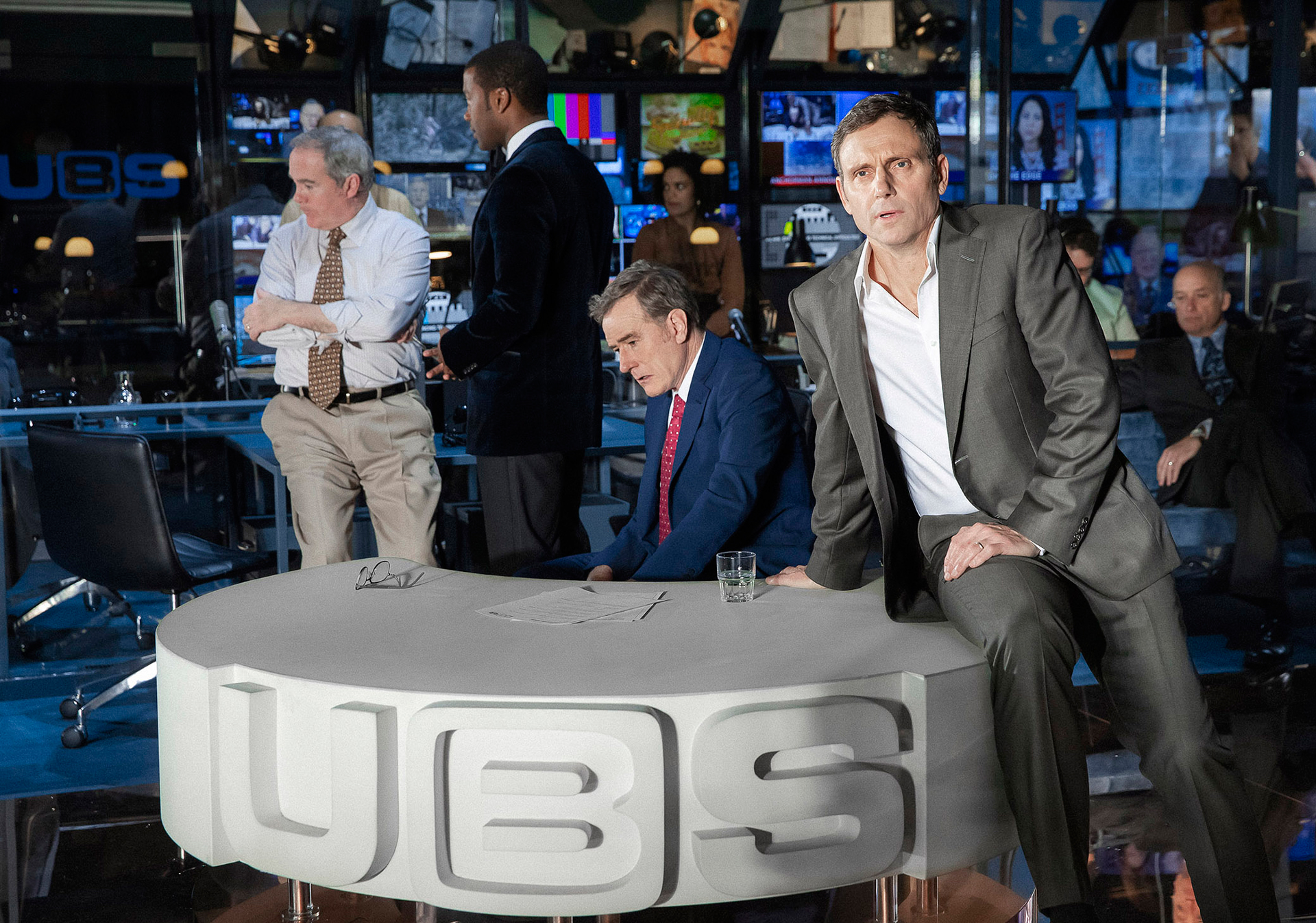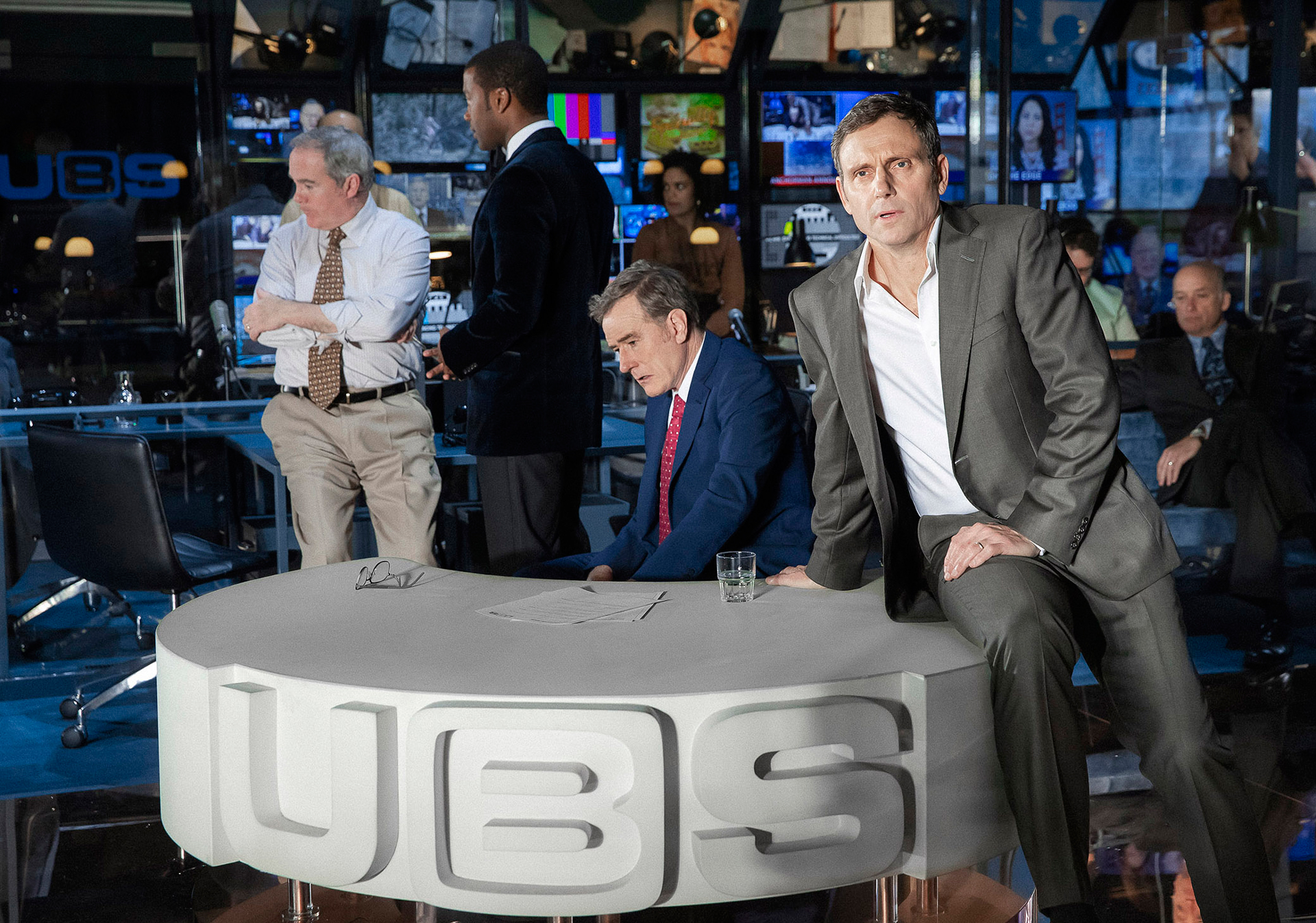‘Network’ Takes On Today’s Technology


Watching a movie is a bit voyeuristic, as we know. Peering behind the scenes, watching people who can’t see you staring at them, like animals in a zoo, is the kind of freedom we’re granted in movie theaters.
It’s that sense of voyeurism, mixed with snide scrutiny, that pervades and prevails throughout director Ivo van Hove’s work. From his early production of Moliére’s “Tartuffe,” at The New York Theater Workshop, where the audience observed the actors on TV screens digging through the rubbish on the street outside, to his adaptation of Luchino Visconti’s “The Damned,” in which the on-stage actors were interviewed and scrutinized by hand-held cameras, van Hove is the paramour/observer of the nefarious.
In “Network,” van Hove’s current production on Broadway, starring the incomparable Bryan Cranston as Howard Beale, the matter of voyeurism is blatant. Lee Hall’s screen-to-stage adaptation of Paddy Chayefsky’s titular film, starring Peter Finch and Faye Dunaway, follows Beale, the evening news anchor, as he loses his mind on air and gains millions of viewers in the process. Although by the end, we get to ask whose voyeurism wins out. The public’s or the corporate giant’s?
Given the time period, the beginning of Ford’s presidency, “corporate giants” is a phrase that we get to hear frequently. Of course, in the play, it relates to the corporate takeover of the fictional UBS-TV network. But the disturbing nature of restructuring, in and of itself, also equates with what is going on in government today. Of course, the media of the moment is Twitter, not network news.
As we hear in voiceover, from a character named The Terrorist, “We live in a society which has never been more technologically able to meet the needs of its people — yet year by year the technology, far from ennobling its users, is increasingly an instrument of political quiescence and social control. What is the effect of this ‘emancipatory’ technology? The rich are becoming exponentially richer while the majority are impoverished.” His rant continues to highlight the crisis of the environment, and the loss of civil liberties.
Designed by Jan Versweyveld, the set vibrates with the excitement of live television, with all kinds of lights and cameras and technical equipment, along with the anachronistic dial-up telephones and projections of TV shows, with footage of Billy Graham and Princess Diana, along with commercials for Mazola Oil and Bromo Seltzer.
In this satire, the Warm Up Guy (Barzin Akhavan) arrives to keep the entertainment peaking. As the opening act for the live audience of the Howard Beale show, Akhavan is an athletic lead, exhorting us to “applaud,” and hitting us with the show’s highlights, such as “Amnesty International has come out against marriage?”
As Beale’s boss, Max, and a man who claims to possess reason, Tony Goldwyn (“Scandal”) portrays a middle-aged man who loses his sense of selfhood through the degrading process of falsifying the news. Much to van Hove’s credit, the colleague with whom he has a dalliance is not at all a femme fatale. His wife, an elegant, intense woman portrayed by Alyssa Bresnahan, is more eye-catchingly beautiful than Diana (Tatiana Maslany). Maslany is superb in the role of a woman who, driven by success, is only out for herself.
As Max’s antagonist, a hot shot, ruthless corporate guy, Joshua Boone is a forceful, albeit necessarily shallow, character.
Meanwhile, Cranston is up to his old antics. Pulling his pants down on network television isn’t his only routine, clearly. He dazzles by being dumbfounded, glitters with uncertainty in a narcissistic, almost girlish way, and teeters on losing reality totally. And he gets us all to join him, literally, in his anthemic plug, “I’m mad as hell, and I’m not gonna take it anymore!”
How sophisticated or refined an image van Hove crafts of our contemporary socio-political demise hardly matters. The cheer and joy of the battling cry is enthralling. If there’s a rally that New Yorkers may go to, this is it!
‘American Son’
Imagine a problem, a political crisis manager the likes of Olivia Pope from “Scandal” cannot fix. Such is the nature of the situation that faces Kendra (played by Kerry Washington) in “American Son.”
If you’ve been watching Washington in her powerhouse role on the ABC series, “Scandal,” you may not even recognize her here. For one thing, she wears jeans and a top, throughout the show’s 90 minutes, and she doesn’t even look like she’s wearing makeup. Olivia Pope wouldn’t be caught dead without a fashion trending wardrobe, but Washington is at her best, playing a mom who is also an accomplished professional woman, on Broadway.
In fact, I only recognized her from the clarity of her diction. Pope always speaks very clearly. But diction is also a concern to the character Washington portrays here, a divorced mother of an 18-year-old, six-foot-two son whose dad (Stephen Pasquale) is white. Jamal, their son, has perfect diction because his mother taught it to him.
The divorced dad, and proud Irish FBI agent arrives at the police station, where Kendra is trying to find out where their son is. It’s the middle of the night, and he’s been missing since 8 PM, when he took the Lexus his dad gifted him to go out with his friends. Jamal has plastered a bumper sticker on it that reads, “Shoot Cops” in big letters. And in small letters, “with your phone whenever they make a bust.” More grist for his mother’s fears about where he now is and why.
And when his parents are told that there were three other African American teenage boys in the car, one of whom has a drug record, their fears ratchet into high gear.
Yes, the cops are the most feared when your prep school son is African American, angry at his dad for leaving him, and unwilling to carry the Irish family tradition of a career in law enforcement. West Point may want to welcome Jamal, but he’s not going.
Indeed, Christopher Demos-Brown’s new play is highly didactic, addressing the conflicts that prevail between the police and the Black Lives Matter movement. That such obvious proselytizing could be equally strong as drama would seem unlikely. But the narrative drives the issue in such a heated and unflinching way, that it is fully engaging. And it’s not moralizing, especially. The situation, and the issue, simply is what it is. Black people have problems with cops, and cops have big problems dealing with black people.
As helmed by Kenny Leon, the stakes are high. Tension and disbelief drive this 90-minute drama. Even the opening scene, when Kendra arrives at the police station to meet with the cop on duty, makes quite an interesting dance. The current of conflict, between the African American mother and the officer is just stiffening. As the officer, Jeremy Jordan, the actor who cut his teeth as the lead in the Broadway musical, “Newsies”, seems particularly natural here, as an easy-going, well-intended, honest, albeit racially unconscious and unconscionable police officer.
The fact that he simply refuses to give Kendra and her ex-husband any information is a mind bender. These two parties are at warring odds. And when the long-awaited Lieutenant Stokes arrives, the only man who has the authority to respond to their questions, he is mean, indifferent, forceful, more rigid than any cop you’ve ever seen, and he is African American. In this role, Eugene Lee rises to the occasion. Lee plays it so straight that it’s creepy.
Pasquale and Washington have explosive chemistry onstage. His emotions run the gamut from stern to vulnerable, from angry to frightened, to devastated, and feeble. And Washington really proves her chops. Raw, intense on stage for the entire 90 minutes, she keeps the show moving, preaching to the choir with all her guts.



